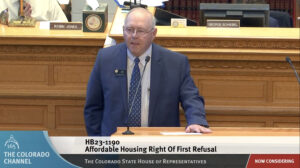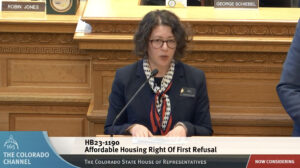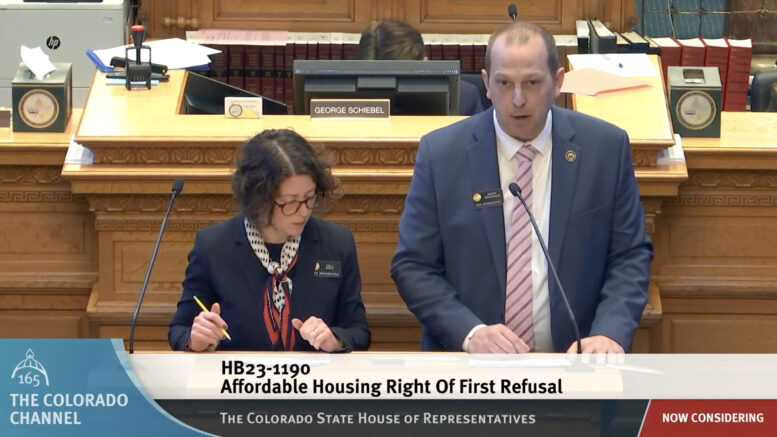A bill to allow local governments the right of first refusal on most apartment complexes that go up for sale passed the Colorado House on Tuesday, amended slightly in business groups’ favor but still allowing for buildings as small as three units to fall under its potential jurisdiction.
House Bill 1190, sponsored by Democratic Reps. Andy Boesenecker of Fort Collins and Emily Sirota of Denver, would make Colorado the first state in which city and county governments could step into a potential property transaction and become the buyer for a similar price. Boesenecker said Tuesday that as more out-of-state companies purchase properties offering below-market rents and refurbish them to boost rates and recoup a return on their investment, local governments need the ability to compete and maintain affordable housing.
Amendments attempted and failed
In the form that the bill came out of the House Transportation, Housing and Local Government Committee last week, it required property sellers to let governments know of pending sales, after which cities or counties would have 14 days to preserve a right of first refusal, 90 more days to match the existing offer and 180 more days beyond that to close on the property. An amendment offered successfully during debate Monday by Rep. Matt Soper, R-Delta, reduced the 90-day window to 60 days and the 180-day window to 120 days after Boesenecker said he viewed that as an acceptable way to make the bill more workable to opponents.
But House Democrats rejected a larger effort by Rep. Marc Catlin, R-Montrose, that would have boosted the minimum number of units necessary for local governments to have the right of first refusal from currently proposed levels — five units in urban areas and three in rural and resort areas — to 40 units anywhere in the state. Catlin’s proposed amendment also would have required property sellers to inform local governments of pending deals but would not have let them step in and purchase the property at the same price offered by a private buyer.

Colorado state Rep. Marc Catlin proposes a major amendment to the right-of-first-refusal bill during House debate on Monday.
Boesenecker said he considered it “dangerous” to redefine a right of first refusal as the ability for a city or county to get a notice rather than to be able to step in and buy a property to maintain it as affordable housing. And after that amendment was rejected Monday, every Republican present on Tuesday — as well as Democratic Reps. Shannon Bird of Westminster, Bob Marshall of Highlands Ranch and Marc Snyder of Manitou Springs — voted against HB 1190, leaving it to pass by a final margin of 43-21.
Impact of the bill
Developers have characterized the bill as one that would stifle both the desperately needed construction of new housing units and the sale of existing ones, as buyers used to closing transactions in as little as a week would not stick out a process that could take half a year. Republicans called the bill a massive government overreach, saying that it inserts cities and counties into private transactions in an unprecedented way.
“This is eminent domain, when the government takes property. This is a seizure of property,” said Rep. Ken DeGraaf, R-Colorado Springs. “The 5th Amendment and the 14th Amendment both restrict this.”
But the bill’s sponsors said that legal precedent in other cities and counties that have passed such a law shows that HB 1190 is constitutional, and Boesenecker noted that it exempts properties that are being transferred to family members via a will or estate. More importantly, they argued, the law gives cities a fighting chance to preserve selectively chosen properties that may now house service workers, law-enforcement officers and teachers that can’t afford market-rate rentals — and to do so at a price set by sellers.
“What we are attempting to do is add one more tool to the toolbox to address affordable housing here in Colorado,” Sirota said Monday during House debate. “We expect that this will be an important tool used sparingly and judiciously by our local governments, but one that can really have a meaningful impact … It is simply an opportunity for local governments to enter into a market that is broken, that does not work.”

Colorado state Rep. Emily Sirota discusses her bill on Monday to give local governments a right of first refusal on apartment-complex sales.
Wide swath of proposals
HB 1190 is one of a wide range of bills legislators are putting forth to try to solve the state’s housing-affordability crisis — ideas that span from the allowance of rent-control laws by local governments to tax credits for employers who contribute money to workers’ housing savings. Gov. Jared Polis is expected to unveil a bill in the coming weeks that would seek to make it easier for homebuilders to avoid some local rules and build new housing along transit lines or add accessory dwelling units to owner-occupied properties.
It comes at a time when the cost of purchasing a home in the Denver metro area has increased 105% over the past eight years, according to research from the business-focused Common Sense Institute. And the efforts are moving ahead while the needed supply of housing units far outnumbers the units available statewide, including by some 30,000 units in Denver, a recent CSI report found.
It’s unclear whether HB 1190 will have a harder time getting through the Senate than it did in sailing through the House on a largely partisan vote. Democratic Sen. Chris Hansen declared during a Denver Metro Association of Realtors event two weeks ago that he did not see the bill allowing for local rent-control laws making it through that chamber, but discussion has been more muted about the effort to establish a local right of first refusal.
